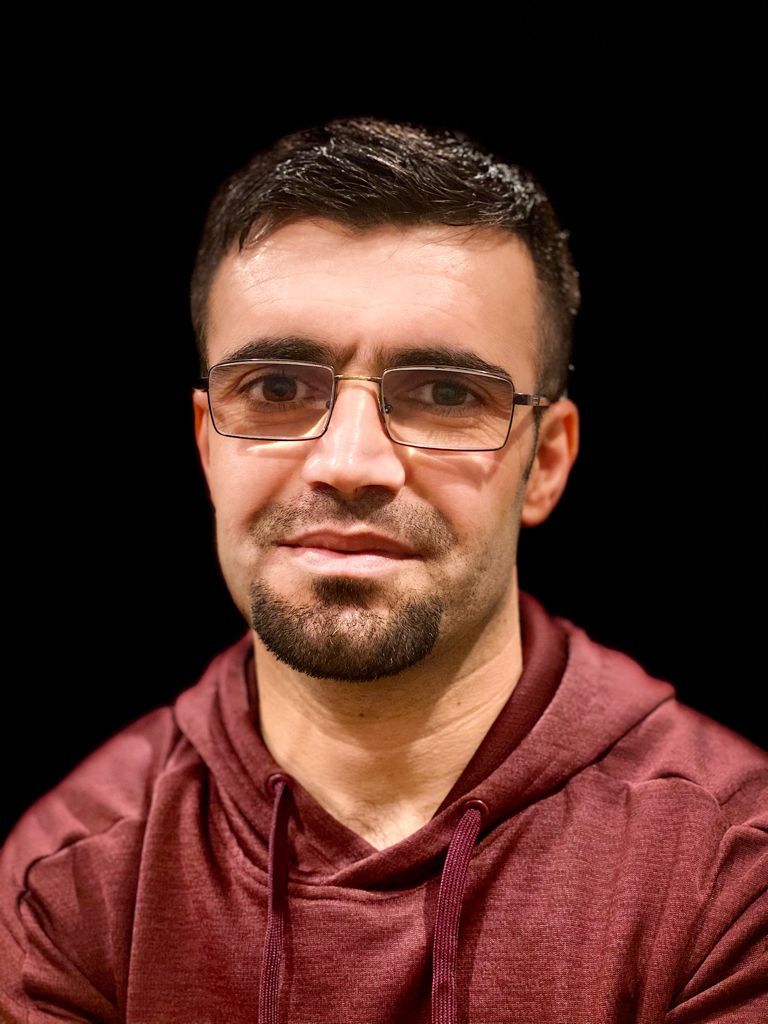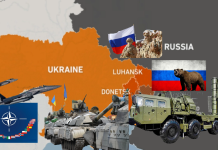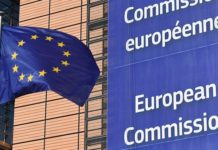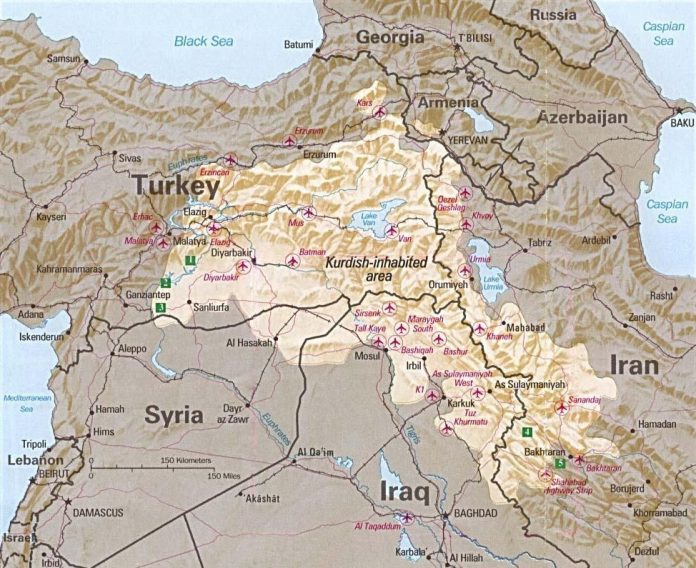In the fourth anniversary of “Kurdistan referendum for independence ” Barzani’s gamble on a nation’s fate
By: Diary Marif
On 25th of September 2017, thousands of Kurds from the Kurdistan region of Iraq marched to election stations. The march was to decide to whether they intend to stay within Iraq or have an independent Kurdistan. Kurds everywhere strive for an independent Kurdistan; however, this desire constantly contradicts reality. Many have attempted to marshal Kurds and unify the nation towards this goal. The outcome seems to suggest such attempts were infertile. It’s been for more than a century the Kurds have wanted to have their own state and end of the uncertainty and oppression in Iraq.
They always look for a person who could bring this dream true, and they see him/ her as a national hero. Barzani wanted to become the hero and he held the referendum. But behind that, Barzani had several personal interests rather than the nation’s fate. The focus of this writing is Barzani’s personal motivations and reasons why he aggressively pursued the “referendum for Independent Kurdistan”, and its consequences.
It is obvious that the former Iraqi Kurdistan president and the president of Kurdistan Democratic Party (KDP) Masoud Barzani’s referendum was not a national process for the betterment, since the region was not ready. The economic situation, the “Peshmergas” Kurdish military forces were weak and divided among the political parties. There was also not a national consensus, preparation, and dialogue with all Kurdish parties, Iraq, neighboring counties, and international forces. Despite all these red lights, Barzani went ahead with his initiative. I believe it was an attempt to cover his party’s internal division.
Barzani’s Objectives in Holding the Referendum:
1- internal motives
Barzani’s personality has always been shrouded with several problems which continually torture him. His attempts to appear as a charismatic leader failed given that he compares himself with great leaders who had real charisma. He inherited his father’s authority as village chief, and he was unable to lead beyond the mentality of a tribal leader. The only reason he was able to achieve power in the first was he inherited his father’s position.
2. Not leaving his office with no legacy
Barzani’s party and his followers called him “National leader” while he has been struggling more than half a century to create a great legacy for the Kurds that they would feel proud of. But his father, Mustafa Barzani (1903-1979), was a charismatic leader who initiated the famous Aylul Movement in the early 1960s against the Iraqi government to fight for Kurdish rights.
Barzani’s rivals such as Jalal Talabani (1933-2017), former Iraqi president and founder of Patriotic Union of Kurdistan (PUK) as well as Nawshirwan Mustafa (1944-2017), general coordinator of Movement for Change were able to instigate another cycle of Kurdish movement in the 1970s.
3.KDP internal issues
Internally, KDP has always been riddled with many problems that have worsened over the years because the party has gotten more power and has to different directions. This problem is expected to escalate when Barzani dies, and it may lead to fractions within KDP as he has been unable to solve them.
Nechirvan Barzani is Masoud Barzani’s nephew and son-in-law who is consistently and vividly in direct conflict with Masoud Barzani’s son Masrour. This raises the pertinent question as to who will eventually lead the party after his death? Therefore, through the referendum, Masoud’s main political aim was to create an atmosphere that would help him to overcome KDP’s internal conflict.
4. Shangal Fiasco
Another problem Barzani and KDP faced was the genocide event against the Yazidis by ISIS which concurrently led to the fall of Shangal city on 3 August 2014. It was apparent that KDP was responsible for the Shangal catastrophe since they held all public positions in the city and the KDP had authority over the city which they prohibited them to leave.
That is why the fall of Shangal has never been brought to court for justice and no clarification has been given about it. This aroused more suspicions on KDP. So, by holding the referendum, Barzani intended to hide the genocide that occurred Shangal.
5. Extending his tenure
Barzani was legally president for two terms from 2005 to 2013. However, he fought hard to illegally extend his tenure for two more years into 2015. He was very aware that extending his presidency for two successive terms illegally had seriously discredited his character.
Therefore, in his attempt to legitimize his presidency, he closed Kurdistan parliament in 2015 and banned the former parliament spokesman, Yousif Mohammed, from entering the capital city of Erbil because the spokesman refused to extend Barzani’s tenure. His closure of parliament is Barzan’s second-worst scandal after inviting Saddam’s forces in 1996.
By discrediting parliament, Barzani aimed to show residents in Kurdistan that they could still make crucial decisions without Parliament. In another sense, they did not need legislation. Thus, the referendum was his attempt to lessen parliament’s power and replace it with his own form of doing politics.
Pan Iraq motives
Barzani had been having problems with the central government of Baghdad, especially the Iraqi Prime Minister Nuri Al Malik (2006-2014). Both Barzani and the Prime Minister had personal disagreements which did not relate directly to democracy, human rights, and more specifically, Kurds’ rights but focused more on issues of power between themselves. Their personal conflict caused more financial and political crises in the country, specifically Kurdistan.
Suffice to say, Barzani ultimately failed to solve the issues within Iraq peacefully as he had expected and instead struggled to use the referendum as a pressure card against Baghdad.
Lack of understanding the rules of neighborhood
Kurdish politicians, Barzani for the most part as he was in the place of making decisions, failed to build an understanding that one day Kurds will be independent. Still, Baghdad sees this move as a threat to it’s unit, an understanding that could have been eased via dialogue with the neighboring countries. Because Turkey, Iran, and Syrian have their own Kurds and they were afraid the Kurds would demand for own states if Iraqi Kurdistan became an independent state.
During the referendum campaign, Barzani and other politicians did not discuss the issue with those countries. In contrast, randomly and carelessly talked against the countries’ interests.
Those unpolitical behaviors brought a surge of national and international concerns. Although several parties including the second major Iraqi Kurdistan party the PUK and nationalists, supported Barzani, many politicians inside Barzani’s party and other parties disagree with the decision. Some intellectuals, activities, and journalists, including me warned holding the referendum was so risky and it would cause dire consequences.
The Iraqi government categorically refused to play Barzani’s political game. The former Iraqi prime minister Hiader al-Abadi warned the referendum, “threatens Iraq”. The neighboring countries; Turkey and Iran, threatened to close their borders and impose severe sanctions on Kurdistan. Many international countries expressed concern about the referendum, the US stated it was “deeply disappointed”. The UN warned about destabilizing effects on the region. Yet, regardless of any negative consequences. Finally, Barzani held the referendum on September 25th, 2017.
The consequences of the referendum
By holding the referendum, there were several direct and indirect outcomes that would potentially contribute to another black chapter in the history of Masoud Barzani.
Losing around 50% of the areas previously controlled by Kurdish forces, Kirkuk, and other dispute areas.
- Kurds disappointed in their leadership because the leader could not read the international codes and they put the dream of independent Kurdistan to the grave.
- The Iraqi government closed channels of communications and gained upper land. The Iraqi government also cut the sharing budget of Kurdistan and the regional government, to this day, still cannot pay public sector salaries.
- Regional powers boycotted Iraqi Kurdistan. They closed their border with Kurdistan. They also bombed the Kurdish villages and employed forces near the borders.
- The western countries did not support the move, and it was absorbed.
- Barzani sided and lost his position, his role became head of his party and occasional appearance on TV for party events.
In indirect consequences:
- Freedom of expression and human rights have decreased significantly.
- The two major parties KDP and PUK have planted the seed of racism among Kurdish people against Arab tourists in Kurdistan and their media outlets encourage the new generation to hate Arabs and other neighboring nations.
- The Kurdish opposition parties lost their identity and they have become part of authorities in the KRG.
- The tribesmen have strongly regained the politics and social power. The rate of social issues such as crime has increased due to the Kurdistan economic crisis and political injustice.

Author: Diary Khalid Marif twitter @diary_khalid
He is a former KNN documentary researcher and Master’s in Art Pune university India. Writing Non-fiction and current affair stories with great analytical angles to the fact. Diary Marif is a Kurdish political analyst. His writing has appeared in the Pasewan, Awene weekly, Daily Hawlati, Lvin, KNN TV, and other outlets. He recently published Non-fiction in English. He is currently based in Vancouver, Canada. You can follow him on Twitter: @diary_khalid
*** Autor’s view is published under freedom of expression. Channel neither agree nor disagree with the view of the author***






















